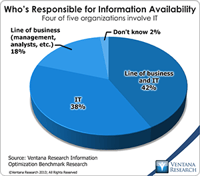IBM redesigned its business intelligence platform, now called IBM Cognos Analytics. Expected to be released by the end of 2015, the new version includes features to help end users model their own data without IT assistance while maintaining the centralized governance and security that the platform already has. Our benchmark research into information optimization shows that simplifying access to information is important to virtually all (97%) participating organizations, but it also finds that...
Read More
Topics:
Big Data,
Mobile Technology,
Wearable Computing,
Operational Performance,
Analytics,
Business Analytics,
Business Intelligence,
Business Performance,
Governance, Risk & Compliance (GRC),
Information Management,
Operational Intelligence,
Uncategorized,
Visualization,
Cognos,
Information Optimization,
Risk & Compliance (GRC),
Watson,
cognos analytics
Read More
Topics:
discovery tools,
exploratory analytics,
Operational Performance,
Business Analytics,
Business Collaboration,
Business Intelligence,
Business Performance,
Financial Performance,
Operational Intelligence,
Cognos,
cognos enterprise,
cognos express,
cognos insight
I believe that one of the more important analytical applications that a company can implement is profitability management. IBM Cognos offers Profitability Modeling and Optimization as part of its Cognos 10 offering that my colleague has assessed. As I’ve noted, most people in a corporation are focused on profitability, but not necessarily in a way that optimizes results across the organization in a day-to-day, consistent fashion. Those responsible for each component piece that contributes to...
Read More
Topics:
Performance Management,
Sales Performance,
Forecast,
Modeling,
Office of Finance,
enterprise profitability management,
Operational Performance,
Business Analytics,
Business Performance,
Financial Performance,
IBM,
Workforce Performance,
Cognos,
Financial Services,
Profitability
Fulfilling its intention to make it easier to access and use analytics and business intelligence, IBM released its Cognos Mobile application natively for the Apple iPad. Of course IBM is not the first to release a native application for the tablet, and many might say that it is late in doing so, but in reality the market for dedicated applications on tablets is just heating up. The adoption rate of the iPad as the tablet of choice for business continues to grow, and while statistics are not yet...
Read More
Topics:
Microsoft,
Sales Performance,
Supply Chain Performance,
Google,
Playbook,
RIM,
Operational Performance,
Business Analytics,
Business Collaboration,
Business Intelligence,
Business Mobility,
Business Performance,
CIO,
IBM,
Mobility,
Workforce Performance,
Cognos,
Digital Technology
Ventana Research recently completed groundbreaking benchmark research on how finance organizations use analytics these days. Of course, analytics have been a mainstay of finance organizations since people started using accounting ratios to assess the health and performance of a business. Yet perhaps because traditional analytics are so deeply entrenched, finance departments execute the basics well but don’t take the next step to fully utilize the power of information technology to use analytics...
Read More
Topics:
Predictive Analytics,
Sales Performance,
SAP,
SAS,
Office of Finance,
Operational Performance,
Analytics,
Business Intelligence,
Business Performance,
Financial Performance,
IBM,
Oracle,
Cognos,
Financial Performance Management
Over the past six years big technology corporations have been acquiring all sorts of software companies, accelerating a general consolidation of the software industry since the dot-com boom ended in 2001. The consolidation has been driven in part by the deceleration of technology innovation in the business software market. Technology evolution, however, has been steady and progressed far enough now that I think we’re about to witness a revolution in how companies use analytics in business...
Read More
Topics:
Big Data,
Mobile,
Planning,
Sales Performance,
Supply Chain Performance,
Budgeting,
Operational Performance,
Analytics,
Business Analytics,
Business Collaboration,
Business Intelligence,
Business Mobility,
Business Performance,
Cloud Computing,
Financial Performance,
IBM,
In-memory,
Workforce Performance,
Cognos,
acquisition











